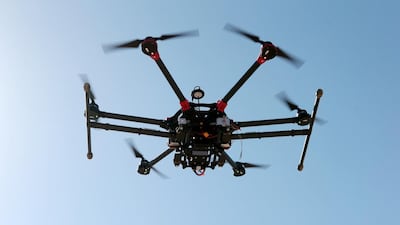Every imported drone will be halted by UAE customs and tested to ensure it matches new specifications for unmanned aerial vehicles.
Aviation officials said devices will be stopped at the point of entry and checked to determine if they are fitted with a number of safeguards.
These include a unique serial number that could be used to track the owner in the event of an accident and a 'geo-fencing' chip that would prevent it from being flown close to sensitive areas, such as an airport.
The move detailed by the General Civil Aviation Authority (GCAA), came amid broader moves to make private ownership in particular more controlled, following a number of incidents at Dubai International Airport last year.
“We are putting the control at the gates, and if a drone doesn’t meet the new standards then it can’t enter the country” said Ismail Al Balooshi, assistant director general of the GCAA.
It has also emerged that private owners, usually hobbyists, will either need to retrofit their drones so they comply with the new rules or buy new ones that have a serial number.
Tougher regulations are due to come into force in September but this is the first time officials have outlined the criteria devices will need to match. Last year, Paul Griffiths, CEO of Dubai Airports, said that "drones should not be sold or operated without a geofence in place" after three airspace shutdowns. Last week, London Gatwick had to divert five aircraft when a drone was seen near a runway.
The Emirates Authority for Standardisation and Metrology along with the Ministry of Interior, Telecommunications Regulatory Authority and the General Civil Aviation Authority have collaborated together to set out new regulatory standards for the use of drones.
The new specifications approved by the Emirates Authority for Standardisation and Metrology (ESMA) will include a surveillance system for deducting unmanned aerial vehicles.
They will demand that all drones must have a serial number which will be regulated by a surveillance system to tack their location.
The UAE’s import requirements will be based on “technical specifications such as size, power- depending on its use of purpose, radio frequency, serial number and if it has a geo-fencing program” as well as many other elements, explained Mr Al Balooshi.
There are three vital stages that will determine whether or not a drone can enter UAE territories, the first is by distributor transparency, second is customs - the drone must comply with the certificate importing standards and thirdly the outlet must fulfil the conditions otherwise the drones will be sent back, said Mr Al Balooshi.
Under the new law, drones owned by individuals will not be allowed to have features to film or record. Only those used for research, development and security purposes will be exempt. Commercial companies that use drones for filming have their own regulations to meet.
Airports worldwide have suffered financial losses as the costs of closure are very high, said Saj Ahmad, chief analyst at the London-based StrategicAero Research.
"Even a 30 minute disruption at somewhere like Dubai International can run into millions because of the cost of displaced airplanes, staff and re-scheduled flights to alternate airports".
The UAE announced new measures, earlier this year to make it more difficult to buy a drone.
Authorities urged that the devices must be registered and users must complete a training course. This is intended to ensure only qualified hobbyists and professionals are using the devices.
Fines of up to Dh20,000 for unregistered drone users came into effect in May, but rules are also needed to tackle misuse.


